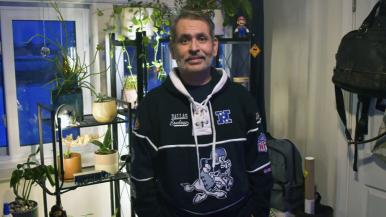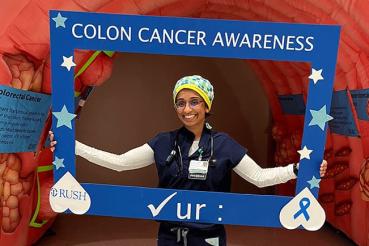As a high school student, Mario Castillo was excited to give blood — if just for the excuse to miss class. He wasn’t expecting his one-time blood donation to lead to a lifelong diagnosis.
“The Red Cross told me they had to throw away my blood,” Mario, now age 53, says. “Something was wrong with my liver, and I needed to go to the doctor to find out more.”
Mario’s family doctor confirmed what the Red Cross had flagged: Mario’s liver was larger than it should be. He was diagnosed with what is now called metabolic dysfunction-associated steatohepatitis, or MASH, a condition that causes liver enlargement and liver damage.
Because Mario already had liver damage, he was told to limit his alcohol use for the rest of his life.
“I didn’t take his warnings seriously,” Mario admits.
From future problem to an emergency
Mario lived for years without any issues — he drank socially and generally lived a normal life. He enjoyed his job as a computer programmer, working remotely from his home in Cary, Illinois.
During the COVID-19 pandemic, Mario, like many other Americans, began drinking more frequently.
“Over time, my mental and physical health went in the toilet,” Mario says. “I was cold all the time, and despite being lethargic, I couldn’t sleep well. My friends noticed my eyes and skin turning yellow, and I had an odd body odor.”
Mario scheduled a physical with his doctor, who immediately flagged his liver as the source of his problems.
“My doctor took one look at me and said, you’re in liver failure,” Mario said. “He told me if I didn’t go straight to the hospital, he’d call an ambulance to take me there. The yellow skin and eyes, fatigue and body odor were all symptoms of liver failure.”
Journey to transplant
In October of 2022, Mario spent five days in the hospital, where he was told he needed a new liver. Following his hospitalization, Mario was referred to Stephen Flamm, MD, a transplant hepatologist at RUSH, who was straightforward about his condition.
“Dr. Flamm spoke the truth and laid it out in a real way,” Mario says. “He told me I was on the brink of death, and that if I continued doing what I was doing, I wouldn’t last a year. I needed to hear that.”
This honest conversation motivated Mario to stay sober, an important step in qualifying for the liver transplant he desperately needed.
A new lease on life
On May 28, 2023, Mario got the news: A liver was available for him. His transplant team, including RUSH transplant surgeon Edie Chan, MD, performed the surgery at RUSH University Medical Center.
“Dr. Chan was the absolute best,” Mario says. “She is the miracle worker, and a real ball of fire. I cannot believe she has the energy she has. Every time I see her, she’s bubbly, smiling and zipping from room to room.”
After his liver transplant, Mario spent seven weeks at RUSH University Medical Center. His recovery went well.
“Everyone at RUSH, from the custodian to the people who brought my food to the nurses to the occupational and physical therapists, were just amazing,” Mario says. “When I had my transplant, I was at the lowest of lows. RUSH swooped in and saved me from myself.”
Mario lived with his parents for seven more weeks to ensure his recovery. Today, he’s back at home, living independently, and he has returned to work, free from the severe symptoms of liver failure.
Mario encourages everyone to register as an organ donor and make their wishes known to family.
“I’m getting a second lease on life, and I want to be on the forefront of advocating for organ donations,” Mario says. “I tell my friends, check the box when getting your license, but also make sure everyone knows that’s what you want. I’ve had a chance to ask people what they think about organ donation and correct silly rumors or misconceptions about the process.”




